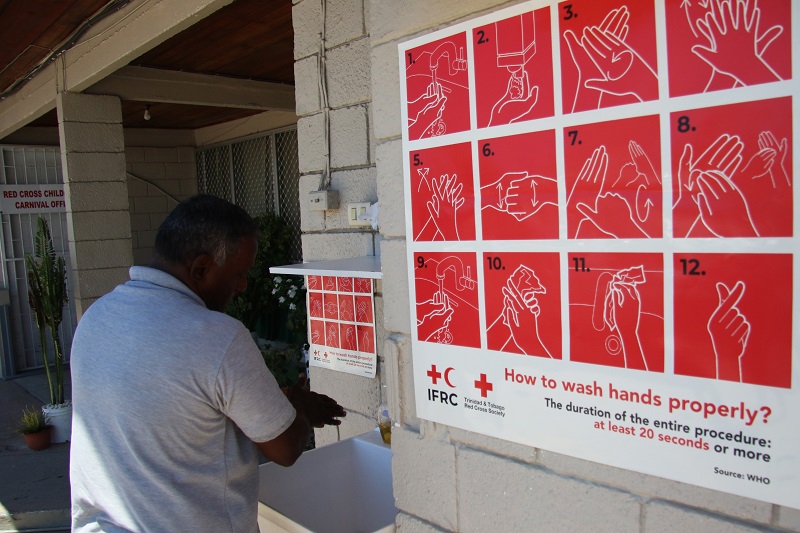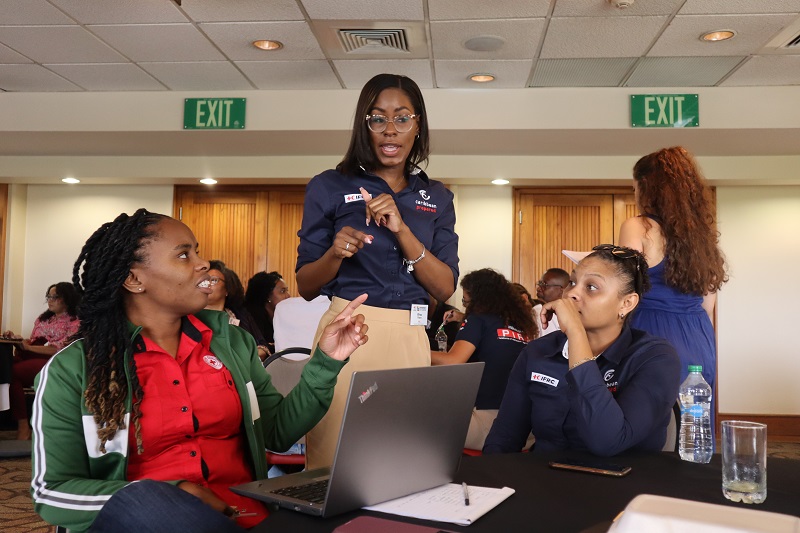Bringing health care into communities
The Caribbean continues to be affected by critical development issues shaped by complex and dynamic social, economic, and environmental challenges, including due to climate change, disaster risks, development, urbanisation, and the COVID-19 pandemic. Among the environmental threats faced by the region are natural hazards and extreme weather events including tropical storms and heavy rainfall. The combination of these issues has potentially devastating effects on lives and livelihoods.
Public health also remains a key issue in the region, particularly non-communicable diseases. We have a conversation with the President of the Trinidad and Tobago Red Cross Society Jill De Bourg to know more about their work in health.
- What are the main areas of health programming of the Trinidad and Tobago Red Cross Society?
For more than ten years, we have been working in HIV prevention. It is especially important as the Caribbean has the second highest rate of HIV and AIDS in the world. We have implemented programmes and campaigns to step up the fight against the virus with the aim of educating people about HIV and AIDS. We do it in collaboration with the Ministry of Health.
During the COVID-19 pandemic, we worked together with stakeholders to raise awareness about how to keep safe. We also supported the Ministry of Health in screening and provided food vouchers to people who needed them.
To help ease the burden that was placed on the healthcare system during the COVID-19 pandemic, in April 2021 we opened the ‘Henry Dunant Clinic’. The clinic is run by volunteer nurses and doctors and powered by solar panels, allowing us to provide free high-quality health care.
The clinic has three rooms. One is an HIV testing centre. The second one is a place where we provide psychosocial support, with in-person sessions or virtual counselling. The last room is a basic care centre, where we follow, for instance, diabetes and blood pressure. For people who are diagnosed as high-risk, we give them a blood pressure or diabetes kit with guidance for the doctor on how to use it, and information on food and exercise. The aim is to minimise the increase of cases that we have been seeing.
As it is difficult for some people to go to the centre, the clinic goes to the communities once per month. We also have a satellite clinic, to reach the biggest number of people possible.
Furthermore, the Ministry of Health has recently launched a programme to collect blood, and we have partnered with them to raise awareness within communities of the benefits of donating blood. There is high demand, but low supply and we are trying to change this reality.
Another critical area is mental health. We saw during the COVID-19 pandemic how important is to talk about how we are coping. Mental health is still a taboo, and we need to normalise speaking about the things that worry and scare us. We mainly work with children and young people on this topic.

- How does the Trinidad and Tobago Red Cross Society work on disease prevention and health promotion with local communities?
November 2022, we experienced floods in Trinidad and Tobago. Trinidad and Tobago Red Cross Society received a Disaster Response Emergency Fund (DREF) allocation from the International Federation of the Red Cross and Red Crescent Societies (IFRC) to support the victims. That support allowed us to hire a public health specialist. This was very important to support the communities understand the health risks that come after a flood, such as from garbage disposal. If the garbage is left outside a house next to the drains it can have negative health consequences. This specialist also guided us in possible programmatic activities.
A great part of our work is to raise awareness in communities. We develop messages to address different groups. We go to communities to talk with people, but we also use different platforms, such as social media.
- How is the Trinidad and Tobago Red Cross Society addressing current challenges and building resilience of communities in the long-term?
As an institution, we first try to understand what we aim to achieve and how we can do it better. It is fundamental to work with partners, such as other organisations or state agencies.
We then work with communities to build resilience. Communities are the first responders, so we are strengthening their capacities so they can feel empowered to respond to a localised event before professional support arrives. In our relationship with communities, we build trust so they can tell us what support they need. We have technical knowledge, but they know what they need. Our goal is to empower them and work together.
Unfortunately, we are getting more frequent disasters, but with this support we see that communities are responding and recovering faster. In partnership with the Ministry of Rural Development and Local Government, we offer a virtual Community Emergency Response Team training. There are currently 3,000 people in these teams. Our aim is to reach 10% of the population.
We are on the ground working with communities, and partnerships are key for success. They need to be based on accountability and transparency. The support of the EU is key in the Caribbean. We are small states affected by consequences of climate change, income inequality and gender disparity.

For media inquiries, please contact Eva Oyón on: eva.oyon@redcross.eu or +32 2 235 09 22

